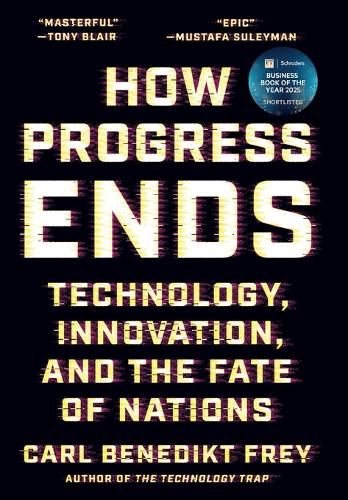Readings Newsletter
Become a Readings Member to make your shopping experience even easier.
Sign in or sign up for free!
You’re not far away from qualifying for FREE standard shipping within Australia
You’ve qualified for FREE standard shipping within Australia
The cart is loading…






Longlisted for the Financial Times and Schroders Business Book of the Year Award
How 1,000 years of global history show why technological and economic progress is often followed by stagnation and even collapse.
In How Progress Ends, Carl Benedikt Frey challenges the conventional belief that economic and technological progress is inevitable. For most of human history, stagnation was the norm, and even today progress and prosperity in the world's largest, most advanced economies the United States and China have fallen short of expectations. To appreciate why we cannot depend on any AI-fuelled great leap forward, Frey offers a remarkable and fascinating journey across the globe, spanning the past 1,000 years, to explain why some societies flourish and others fail in the wake of rapid technological change.
By examining key historical moments from the rise of the steam engine to the dawn of AI Frey shows why technological shifts have shaped, and sometimes destabilised, entire civilisations. He explores why some leading technological powers of the past such as Song China, the Dutch Republic, and Victorian Britain ultimately lost their innovative edge, why some modern nations such as Japan had periods of rapid growth followed by stagnation, and why planned economies like the Soviet Union collapsed after brief surges of progress. Frey uncovers a recurring tension in history: while decentralisation fosters the exploration of new technologies, bureaucracy is crucial for scaling them. When institutions fail to adapt to technological change, stagnation inevitably follows. Only by carefully balancing decentralisation and bureaucracy can nations innovate and grow over the long term findings that have worrying implications for the United States, Europe, China, and other economies today.
Through a rich narrative that weaves together history, economics, and technology, How Progress Ends reveals that managing the future requires us to draw the right lessons from the past.
'[Frey's] broad yet deep survey of technology ranges across many nations and centuries, and pokes insightfully into myriad subjects, from Carolingian feudalism to patent law. The result is an incisive and stimulating consideration of a critical issue.' Publishers Weekly 'A fascinating quasi-historical economic examination of why some societies flourish and others flounder amidst innovation.' Library Journal
$9.00 standard shipping within Australia
FREE standard shipping within Australia for orders over $100.00
Express & International shipping calculated at checkout
Stock availability can be subject to change without notice. We recommend calling the shop or contacting our online team to check availability of low stock items. Please see our Shopping Online page for more details.
Longlisted for the Financial Times and Schroders Business Book of the Year Award
How 1,000 years of global history show why technological and economic progress is often followed by stagnation and even collapse.
In How Progress Ends, Carl Benedikt Frey challenges the conventional belief that economic and technological progress is inevitable. For most of human history, stagnation was the norm, and even today progress and prosperity in the world's largest, most advanced economies the United States and China have fallen short of expectations. To appreciate why we cannot depend on any AI-fuelled great leap forward, Frey offers a remarkable and fascinating journey across the globe, spanning the past 1,000 years, to explain why some societies flourish and others fail in the wake of rapid technological change.
By examining key historical moments from the rise of the steam engine to the dawn of AI Frey shows why technological shifts have shaped, and sometimes destabilised, entire civilisations. He explores why some leading technological powers of the past such as Song China, the Dutch Republic, and Victorian Britain ultimately lost their innovative edge, why some modern nations such as Japan had periods of rapid growth followed by stagnation, and why planned economies like the Soviet Union collapsed after brief surges of progress. Frey uncovers a recurring tension in history: while decentralisation fosters the exploration of new technologies, bureaucracy is crucial for scaling them. When institutions fail to adapt to technological change, stagnation inevitably follows. Only by carefully balancing decentralisation and bureaucracy can nations innovate and grow over the long term findings that have worrying implications for the United States, Europe, China, and other economies today.
Through a rich narrative that weaves together history, economics, and technology, How Progress Ends reveals that managing the future requires us to draw the right lessons from the past.
'[Frey's] broad yet deep survey of technology ranges across many nations and centuries, and pokes insightfully into myriad subjects, from Carolingian feudalism to patent law. The result is an incisive and stimulating consideration of a critical issue.' Publishers Weekly 'A fascinating quasi-historical economic examination of why some societies flourish and others flounder amidst innovation.' Library Journal